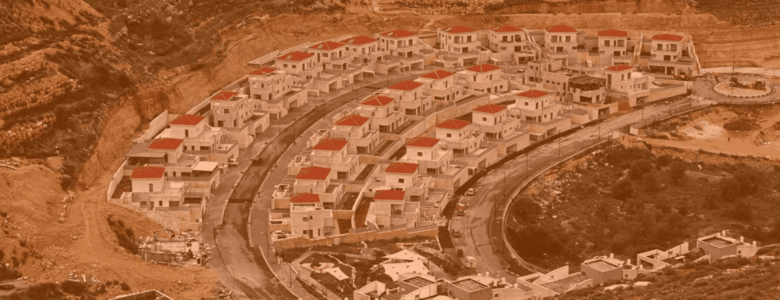
Stop booking apartheid: Why Booking.com must end listings in illegal Israeli settlements
Booking.com, one of the world’s largest online travel platforms, plays an active role in legitimising the Israeli occupation of Palestinian territories. While the world watches civilians in Gaza being bombed and ethnic cleansing continuing in East Jerusalem and the West Bank, Booking.com continues to profit from accommodations in illegal Israeli settlements.
These settlements have been recognised by the United Nations and the International Criminal Court as violations of international law. Yet Booking.com promotes them as if they are ordinary holiday destinations, thereby normalising violence, land theft, and apartheid. In doing so, the platform becomes complicit in undermining human rights and in the structural oppression of the Palestinian people.
Workers have since organised internally to challenge Booking.com’s complicity by circulating multiple petitions within the company. These have garnered over 300 signatories, calling on the platform to stop listing accommodation in illegal settlements. However, these petitions have been removed from the company’s internal network – yet another instance of the policing of Palestine solidarity within Booking.com.
International Day of Action – Thursday, May 8
For years, activists, human rights organisations, and conscientious consumers have called on Booking.com to end these practices. Yet the company remains deaf to demands for ethical business conduct. As long as this continues, our message remains clear: no business with oppression. We urge everyone to pressure Booking.com, boycott its services, and choose alternatives that genuinely respect human rights.
That is why DiEM25 in the Netherlands supports the campaign: Stop Booking Apartheid.
Freedom is not a vacation option – it is a fundamental right.
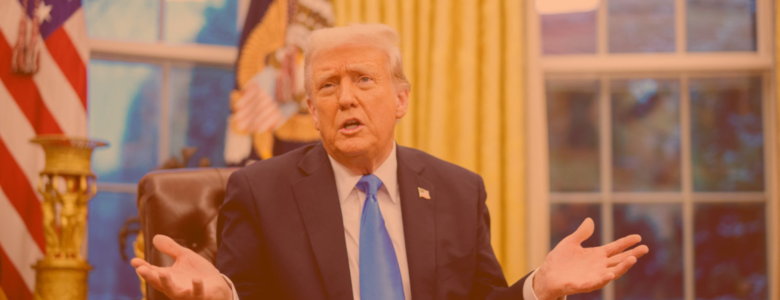
How the Trump Shock exposed the delusions of Europe’s centrists
The Trump Shock has revealed just how unprepared the UK and EU are for a collapsing global order
There is a delicious irony in the way our governing centrists, in the United Kingdom and the European Union, are lamenting the Trump Shock. They wax lyrical about the globalised, financialised capitalist order which they now mourn. They portray it as a golden age, a natural global system of free trade and benign capital flows. Are they truly oblivious to the facts of recent economic history? Do they not know that the grossly imbalanced, extractive, Ponzi-like financialised global capitalism that spawned the crises which propelled Donald Trump into the White House was also birthed by a major shock? The Nixon Shock?
Centrists admonish the Trump boys for having turned on their allies, but they forget that the Nixon Shock was equally, if not more so, an intentional and devastating assault on Europe, Japan, and the UK. They seem unaware that, precisely because of the economic devastation caused in the 1970s and 1980s – including in America’s heartlands – the Nixon Shock’s architects, men like Paul Volcker, achieved their main long-term objective: to ensure that American hegemony grew alongside America’s trade and government budget deficits, not to mention on the back of financial rents earned at the expense of real value creation.
Many seem puzzled that, while the EU and Britain differ in important ways – mainly in that the EU is running a huge surplus with the United States while the UK remains a deficit economy – our centrist regimes on both sides of the Channel seem equally at a loss. There is a reason for this. Since 1971, our economies have been hooked into the same US-centric global surplus recycling mechanism whose deep crisis is steering our politics into the arms of the xenophobic ultra-right – with our electorates increasingly pummelled by nasty undercurrents fuelled by the crisis of this global recycling mechanism that once drove Europe’s and Britain’s growth and relative stability.
The essence of this global recycling mechanism (which I once labelled The Global Minotaur) is simple: since the 1970s, America’s deficits provided Germany, Japan, and later China the demand for their factories’ manufactures. In return, the EU, Japan, and later China sent their accumulated profits to Wall Street and its appendage, the City of London, to be recycled into the US rentier sector: private and public debt, some equities, and real estate. A Chinese official once described this mechanism to me as a Dark Deal. “Our Dark Deal with the Americans,” he explained, “turns on the US trade deficit, which keeps demand for our manufactures high. In return, our capitalists invest the bulk of their dollar superprofits into America’s rentier economy – Finance, Insurance, and Real Estate. Once this process got underway,” he concluded, “America shifted much of its industrial production to our shores.”
The problem with this global recycling mechanism was that, to function smoothly, it had to generate larger and larger imbalances – greater trade deficits for the US, and more accumulated rents for Northern Europe and East Asia. But there are limits to how large imbalances can grow, both in terms of trade deficits and in terms of profits versus rents. Ruptures are inevitable. The longer they are delayed, the greater the pain they inflict – a truth that centrists never acknowledged, not even when the Crash of 2008 was tearing down their houses.
Trump’s boys have dared to ask the pressing question that the centrists refuse to countenance: what comes after the Dark Deal, once the imbalances built on the US trade deficit prove unsustainably massive?
Their proposed solutions may seem wrongheaded, half-baked, even crazy, but at least Trump’s team has identified the American ruling class’s problem: how to maintain US hegemony in the face of America’s rapid deindustrialisation, with the Triffin Dilemma hanging over their heads, and now that financial rents are being replaced by what I call cloud rents. In contrast, UK and EU politicians are utterly out of their depth, running around like decapitated chickens, oscillating between vacuous bravado and servility to The Donald.
Guy Standing suggested that today I focus on how Europe and the UK should respond to the Trump Shock. I could talk endlessly on this. I could, for example, recommend not just a 10% cloud tax by which to clobber Big Tech but also repealing all regulations that we introduced in Europe to comply with Bill Clinton’s despicable ‘anticircumvention’ Act – which is why you can’t buy a jailbreaking tool so your printer can recognise and use cheaper, generic ink cartridges. I could recommend that our governments rescind all tariffs imposed at the behest of Washington on excellent Chinese solar panels and electric vehicles, while entering into a serious EU-UK-Chinese dialogue with a view to stimulate our economies in a coordinated fashion, so as to stem the recessionary wave coming from Trump’s America. I could recommend that Europe begins its own peace negotiations with Russia over Ukraine, rejecting the plunder of Ukraine’s underground wealth by Trump’s boys.
But, in all honesty, I can’t find the energy to make these recommendations when I know that the Radical Centre in power, in Britain and in the EU, will do everything they can to not do any of that – in exactly the same way they botched the euro crisis or squandered the opportunities offered by the pandemic. Determined to remain wedded to America’s rentier economy, Europe’s and Britain’s elites will not deviate from current policies – not unless we overthrow them first. But for this, we need an agenda bolder than Trump’s and Farage’s and, of course, a radically humanist one – an agenda that is not fearful of radical proposals like a public green investment bank, a trust fund for everyone yielding an unconditional personal income, the termination of all quasi-energy markets, the socialisation of housing and, last but not least, a surge in corporations practising one-employee-one-member-one-vote.
Meanwhile, as we struggle to give political representation to such an agenda, all eyes on China – the only country, for better or worse, that seems willing and able (though not predestined) to counter Trump’s bullies, to boost green energy production, and to work toward turning the BRICS into a new Bretton Woods serving the interests of the Global South.
For more thoughts on the world’s response to the Trump Shock, watch this space.

CO₂ storage in Prinos: A dangerous greenwashing scam
A seismic, ecological, and political threat disguised as climate action – Prinos is not the solution, it’s the problem
We are once again confronting a corporate scam dressed up as ‘green technology’ – the CO₂ storage project in Prinos, Greece. The government and fossil fuel giants want us to believe that burying CO₂ underground is a “solution” to the climate crisis. But we know better.
This is a dangerous distraction that prolongs our fossil fuel dependency while endangering communities and ecosystems.
The false promise of Carbon Capture (CCS): Earthquakes, contamination, safety threat
The Prinos project claims it will “reduce emissions” by injecting CO₂ into depleted oil fields. But CCS is an unproven, expensive failure – used by oil companies to justify more drilling, more pollution, and more profit.
Studies show CCS can leak, contaminate groundwater, and displace communities. This isn’t ‘green tech’ – it’s corporate greenwashing at its worst.
The Prinos reservoir sits on a seismic fault, with CO₂ stored in porous limestone – a geological recipe for disaster.
CO₂ under pressure erodes limestone, weakening the rock. Even minor earthquakes – common in Greece – could crack seals, unleashing deadly gas plumes. Think of the Lake Nyos disaster in Cameroon, which killed thousands.
Leaks would acidify groundwater, poisoning drinking water and fisheries. The Northern Aegean – already suffering from industrial pollution – could face ecological collapse.
Energean insists the site is “stable” but so did those behind Italy’s Stava Dam, which collapsed and killed 268 people. Profit-driven risk assessments ignore worst-case scenarios.
This is not climate action – it’s playing Russian roulette with an entire region’s future.
Who really benefits?
The same politicians slashing healthcare and privatising public goods are now handing millions in subsidies to oil companies like Energean.
This project doesn’t transition us to renewables – it delays it. The elite profit while the planet burns.
Local resistance is growing – so must our solidarity
The people of Thassos and Kavala are rising up. They’re demanding local referendums. They’re refusing to be sacrificed for corporate greed.
We must escalate the resistance:
- Expose the lies of CCS through media, direct action, and publications
- Reject the false “jobs vs. environment” narrative
- Remember: locals are not just defending their land – they’re fighting for their lives
Will we wait for the first leak? The first earthquake? Or will we stop this now?
This is a global fight
This is a global system of exploitation – where corporations and governments sacrifice people and the planet for profit.
From Prinos to the Niger Delta, from lignite mines in Greece to lithium extraction in the Global South, the pattern is the same: environmental destruction, displacement, and greenwashing.
And as we condemn CO₂ colonialism in Prinos, we must also denounce all forms of environmental violence – including the war on Gaza, where Israel’s bombing and blockade are destroying water sources, farmland, and hospitals. These are also acts of ecological warfare.
Our struggles are distinct – but our enemy is shared: a system that treats lives and land as disposable.
Key facts:
- Limestone leaks: CO₂ storage in calcareous rock increases leak risk due to chemical corrosion
- Seismic proof: Italy’s 2012 Emilia-Romagna quakes reactivated methane reservoirs—fuel storage makes seismic zones more dangerous
We won’t let Greece become Europe’s toxic dumping ground.
Our demands:
- Cancel the Prinos CO₂ project—no public money for fossil fuel lies
- Real, local renewable energy—100% public, democratic, and worker-controlled
- Stand with Thassos, Kavala, and all frontline communities
Comrades, the climate crisis won’t be solved by corporate tricks. It will be solved by us – in the streets, in our workplaces, in the fight for climate justice.
No to CO₂ storage – yes to our planet!

Liberation Day in the Netherlands: How free are we?
This May 5, as we honour the past, we must also look forward – to a vision of freedom not hijacked by hatred, but empowered by equality, compassion, and democracy
May 5 is the day the freedom is celebrated in the Netherlands. But that freedom is increasingly under threat.
Here in the Netherlands, we see how polarisation, disinformation, and authoritarian tendencies are driving a shift toward the far right. Along with that shift comes an ideology rooted in racism, inequality, intolerance, sexism, hatred, and exclusion – ideals that are gaining ground in our country.
But that’s not who we are. We are a nation that values freedom.
The struggle for our freedom continues
Freedom alone is not enough to counter the destructive forces represented by the PVV and its supporters. Ethics and social justice must go hand in hand with freedom. These values are inseparable – because freedom without justice and equality is not true freedom. It undermines the foundations of our democracy and the rule of law. And that’s not the path that will lead us out of the downward spiral we currently face.
Organising for freedom
That’s why DiEM25 in the Netherlands is actively working to build and shape our political party, MERA25 Netherlands.
We believe that freedom belongs to everyone – not that one person’s freedom should come at the expense of another’s. Somewhere along the way, the West has forgotten what Aristotle taught us: that virtue and ethics are inseparably tied to both freedom and economics. MERA25 Netherlands is committed to restoring these values to their rightful place.
We believe in people
We believe in an inclusive society where people work together to make collective freedom a reality. We believe in cooperation and solidarity, in the principles of nature, in a Green New Deal for Europe, in demilitarisation, in Universal Basic Income, in an end to war, to apartheid, and to genocide – but most of all, we believe in people.
We know we can do better than fighting over scraps of freedom that remain out of reach for most, while the gap between rich and poor grows ever wider. If we don’t work together to achieve real freedom, it will remain nothing more than a hollow dream.
That’s why we’re committed to MERA25 Netherlands. Join us. Because together, we won’t just dream of freedom and equality – we will make it real.

Remembrance Day in the Netherlands: What do you stand for?
Hopefully tonight, on Remembrance Day in the Netherlands, we will all pause for two minutes to reflect on the atrocities committed in the past, and say to ourselves: This, never again.
But what does “this” mean?
Does it mean we will never again allow a government to demonise a minority and normalise hatred toward them?
Does it mean we will never again permit a foreign government to imprison, starve, and exterminate millions of people because of their faith and heritage, without doing everything in our power to stop them?
Does it mean we will never again stand by as our own government not only downplays the suffering of a group of people, but even cheers on the war criminals?
All my life I’ve heard people ask the question: What would you have done during the Second World War? And everyone always answers: “I would have joined the resistance.” But what are those people doing now? Today they are silent for two minutes, and then?
Our two minutes of silence should not be just a symbolic tribute. Two minutes of thinking about what we never want to happen again are meaningless if we remain silent in the moments when it actually happens. Because it is still happening. All over the world, people continue to die because of the same false and narrow-minded ideas that caused so much pain and suffering in the past.
Silence is consent. So don’t ask what you would have done back then.
Ask: what are you doing now?
Are you still standing up for what’s right?
Then join DiEM25, a transnational movement that fights for equality, regardless of who you are or where you come from.
I’ll see you there.
Carpe Diem.
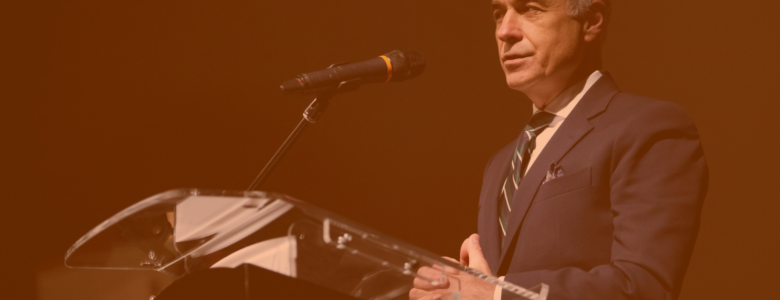
Romania’s sham election: Călin Georgescu ban exposes EU hypocrisy
As Romanians prepare to head to the polls on May 4 and 18, they do so under the shadow of a deep betrayal of democracy. Călin Georgescu, the candidate who won the first round of last year’s presidential elections, has been banned from running, under the flimsy and increasingly weaponised accusation of “Russian interference”.
Whatever one may think of Georgescu’s political positions, banning a candidate after an electoral victory strikes at the heart of democracy itself. It is the textbook definition of lawfare – using judicial and administrative measures to sideline political opponents that the establishment fears they cannot defeat at the ballot box.
The European Union and its mouthpieces frequently lecture others about “democratic values” and “the rule of law”. Yet, when a candidate emerges who dares to challenge NATO’s war agenda or questions the EU’s political orthodoxy, those very principles are thrown out the window.
Georgescu’s vocal opposition to the continuation of the Ukraine war – and by extension, to NATO’s aggressive expansion – clearly made him a threat, especially as NATO builds its largest military base in Europe on Romanian soil. His silencing is no coincidence; it is a political manoeuvre.
As continues to be proven, such acts of repression do not eliminate dissent – they radicalise it. By banning candidates like Georgescu, the establishment is only turbocharging the growth of far-right and anti-democratic forces. When citizens see their votes disregarded and the political process rigged, they will inevitably turn to those who promise to tear the system down – often with far more dangerous agendas.
The Romanian case is not isolated. Across Europe, we are witnessing a pattern, like with the recent conviction of Marine Le Pen, in a textbook case of ‘lawfare‘: when establishment-backed candidates falter, institutions are bent, laws are twisted, and elections are manipulated to preserve a decaying order.
If the EU wants to speak credibly about democracy, it must first confront the anti-democratic rot within its own ranks – starting with Romania’s grotesque exclusion of Georgescu from the upcoming election.
Democracy cannot be selectively applied. It must be defended for all, or it collapses for everyone.
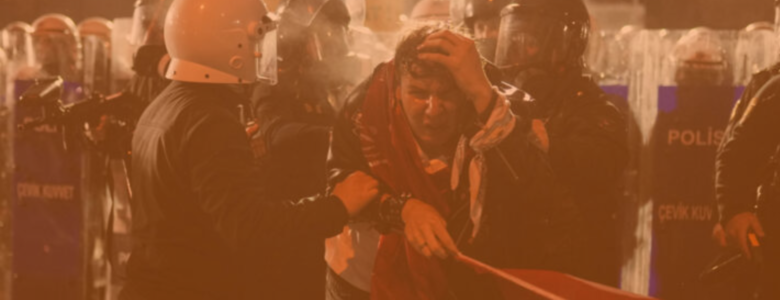
The silencing machine: How Europe and its allies are crushing journalists
From Berlin to Athens, from Ankara to Zurich, those who challenge the dominant narratives are silenced. On World Press Freedom Day, we provide a reminder on why we must all fight back
We were told that freedom of the press was a pillar of democracy. That it had been achieved – won long ago, enshrined in law, protected by institutions. But like democracy itself, press freedom has never truly arrived. It’s an ongoing struggle, not a trophy in a museum.
Today, in Turkey, Germany, Switzerland, Greece and beyond, this freedom is not only incomplete – it’s under full-scale attack.
In Turkey, journalism has become a crime scene. This spring, journalists Timur Soykan (BirGün) and Murat Ağırel (Cumhuriyet) were arrested, accused of blackmail and threats – but everyone knew the real reason: they had reported on corruption and state abuses tied to Istanbul’s opposition mayor, a political threat to Recep Tayyip Erdoğan’s regime. Their work exposed truths too inconvenient to be ignored. So the state did what it does best – it shut them up.
Elsewhere in Turkey, the tactics are more brutal. In March, seven Kurdish journalists were jailed for daring to investigate – and mourn – the deaths of colleagues killed in Turkish drone strikes. Their arrests weren’t just punishment – they were a message: Kurdish voices are disposable.
Other journalists face slower forms of state violence. Nurcan Yalçın and Derya Us were pulled from their homes in early-morning raids – not charged, not convicted – just harassed into silence. Travel bans, police reporting, surveillance: a soft suffocation of their basic rights.
And yet, they persist. In 2024 alone, 181 journalists were put on trial in Turkey. Fifty-eight were detained. Judges handed out over 24 years in combined prison sentences – not for violence, fraud, or hate speech, but for publishing.
But don’t think this is just Turkey’s problem.
In Germany, repression looks more polished, more bureaucratic – but no less dangerous. Melanie Schweitzer, a lawyer at the Federal Ministry of Labour, was fired in December 2023. Her offence? Publicly condemning Israel’s actions in Gaza and calling for Palestinian rights – views well within the bounds of international law, and shared by millions worldwide. But in Germany’s political climate, even mild dissent is treated as scandalous. Her dismissal made it clear: state employees are expected to remain silent — or side with power. Anything else could cost you your career.
In Switzerland, journalist Melissa Müller found herself repeatedly censored by her editors at Blick. Words like “apartheid” and “colonialism” were scrubbed from her articles. Critical stories on Palestine were spiked. Eventually, she left – and spoke out. In doing so, she revealed what many journalists across Europe already know but few dare to say: press freedom ends where Palestine begins.
And then there’s the ultimate form of censorship: assassination. In Greece, respected crime and corruption reporter Giorgos Karaivaz was gunned down in broad daylight outside his home in Athens in 2021. A killing that shocked the country – and Europe – but to this day remains unsolved. For years, Karaivaz investigated links between organised crime and law enforcement. He exposed uncomfortable truths. He paid the price.
Three years later: no convictions. No political reckoning. Just silence.
From Berlin to Athens, from Ankara to Zurich, those who challenge the dominant narrative – on war, on occupation, on state violence, on corruption – are silenced. Some with jail cells. Others with HR memos. Others still with bullets.
But the effect is the same: a journalism that flatters the powerful and buries the rest.
At DiEM25, we know that journalism isn’t a luxury. It’s the first line of defence in any functioning democracy. That’s why we stand with those who speak when it’s dangerous to speak – from Julian Assange, imprisoned for exposing war crimes; to Melanie Schweitzer, fired for her principles; to Melissa Müller, who walked away from her job rather than compromise the truth; to Giorgos Karaivaz, who gave his life in pursuit of it.
What do we want?
- A Europe where the press is actually free – not on paper, but in reality.
- Where telling the truth isn’t a risk, but a right.
- Where solidarity with Palestine isn’t a fireable offence.
- Where investigating corruption doesn’t end in murder.
- Where states don’t get to decide what journalists can and cannot say.
We want justice for those already punished, and protection for those still fighting.
Because if we don’t fight for press freedom now – while it’s under siege – we may not have the chance later.

Tell Ireland’s Central Bank: Stop funding genocide in Gaza
Despite international rulings and mounting evidence of genocide, the Central Bank of Ireland continues to approve Israeli war bond sales across the EU
The International Court of Justice’s (ICJ) ruled in January 2024 that the claim of genocide in Gaza is plausible and specified provisional measures to protect Palestinian people under the Genocide Convention. It specified further additional provisional measures in March and May 2024. Since then, reports by Amnesty International, Human Rights Watch, and a UN Special Committee have all confirmed that genocidal acts have been undertaken by Israel. The Israeli military is now importing Gaza abuses into the illegally occupied West Bank.
States cannot claim they are unaware of this situation and, as soon as they are aware, they are obligated under international law to deploy all means reasonably available to them to prevent genocide. They become complicit if they provide aid and assistance that facilitates the perpetrators to carry out this crime.
Between the October 7, 2023 and January 2025, $19.4 billion was raised for the Israeli state through the issue of Israel “war bonds” and $4.49 billion of this amount was raised through two underwriters in the EU: BNP Paribas and Deutsche Bank. These bonds are marketed as supporting Israel in a time of war and are being used to raise funds to sustain its ongoing genocide against Palestinians and its wars in the wider region.
For Israel to sell its “war bonds” in the EU, the prospectus for these bonds must be approved by a Central Bank in an EU country. After Brexit, it is the Central Bank of Ireland (CBI) that carries out this role.
In Ireland people, including DiEM25 members, are supporting the Palestine Solidarity Campaign’s (IPSC) ongoing campaign targeting the CBI. They recently brought charges against CBI officials for complicity in Israel’s genocide. This campaign also has regular protests outside and occupations inside the CBI Head Office. In addition, workers at the CBI, Trade Unions, Student Unions, Community Associations, elected representatives at local and national levels and individual citizens are being made aware of the problem and are taking action to impress upon the CBI Governors, and ultimately the Irish Government, to stop the facilitation of these nefarious war bonds.
Although it is not possible for every concerned person in the EU to directly participate in these on-the-ground activities, each and everyone of us can play a very important role in this campaign for human rights and justice. As the CBI effectively acts as a branch of the European Central Bank (ECB) by enabling Israel “war bonds” to be sold across the EU, citizens/residents of EU countries can join in solidarity with this campaign and help bring the sickening complicity with Israel’s genocide to an end. To do this we are asking you as citizens/residents of an EU country to send the model letter (enclosed below) to the Governor and Deputy Governors of the CBI demanding that they end their role in funding Israel’s genocide.
If this campaign is successful, it will send a powerful message that citizens will not tolerate our governments’ and institutions’ complicity in genocide, war crimes and crimes against humanity, and further increase pressure on them to take concrete steps to end it.
Take action now
Model Letter to copy and paste (with some of your own wording preferences if possible), and email:
To: Governor of the Central Bank, Gabriel Makhlouf, at gabriel.makhlouf@centralbank.ie
cc: Deputy Governors at vasileios.madouros@centralbank.ie and derville.rowland@centralbank.ie
Subject: Irish Central Bank’s role in enabling the sale of Israel bonds in the EU
Dear Governor,
As a citizen/resident of an EU country, I am writing to express my deep concern that the Central Bank of Ireland (CBI) continues to enable Israel bonds to be sold in the EU.
The CEO of Israel Bonds, who is a member of the international board of directors, made plain in a television broadcast on 16 October 2023 that one of the purposes of Israeli government bonds being purchased by people around the world is to support the “war campaign”.
This is the same “war campaign” of which: the International Court of Justice’s (ICJ) ruled in January 2024 that the claim that Israel is committing genocide in Gaza is plausible; reports by Amnesty International, Human Rights Watch, and a UN Special Committee since the ICJ ruling in January 2024 have all confirmed that genocidal acts have been undertaken by Israel; and the International Criminal Court (ICC) has concluded that crimes against humanity and war crimes have been committed, resulting in arrest warrants being issued against the Israeli Prime Minister and former Defence Minister.
States, organisations and individuals have obligations not to provide aid or assistance to “war campaigns” where there is evidence of a plausible risk that genocide is being committed, or crimes against humanity or war crimes are being committed.
It is my understanding that the prospectus documentation that the ICB continues to approve withholds important information. It does not clearly state that the State of Israel, the issuer, is raising money, at least in part, to support a “war campaign” and the risks associated with this specific “war campaign”.
Without this information, investors may not realise that by buying Israeli bonds they are at risk of aiding Israel financially to undertake a “war campaign” which the ICJ considers is plausibly genocidal and in which the ICC deems Israel to have committed crimes against humanity and war crimes.
I therefore respectfully demand that you ensure that all measures at the CBI’s disposal are taken, as a matter of urgency, to end this situation and end the CBI’s role in enabling the sale of Israel bonds within the EU.
Yours sincerely,
Name:
EU country of residence/citizenship:
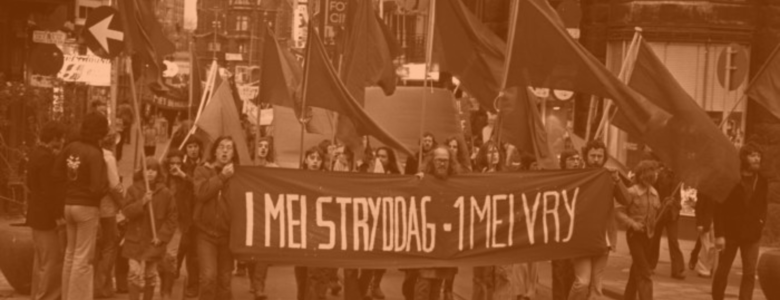
Labour Day: More than a commemoration – a call to action
On International Workers’ Day, DiEM25 calls for fair wages, democratic workplaces, and a Europe that puts people before profit
On May 1, we honour the global struggle for dignity, justice, and workers’ rights. For DiEM25, International Workers’ Day is not a tradition of the past but a powerful reminder of the need for collective action – and of the urgent demand for change, especially today.
A history of struggle – including in the Netherlands
May 1 originated in the international fight for the eight-hour workday, most famously marked by the bloody Haymarket Affair in Chicago in 1886. The Netherlands has a rich May Day tradition as well. In 1890, International Workers’ Day was celebrated for the first time in the country, led by Ferdinand Domela Nieuwenhuis and the Social Democratic League. What began as a demonstration of solidarity became an annual day of action, hope, and political awareness.
Yet May 1 has never been recognised as an official holiday in the Netherlands – a reflection of the state’s longstanding reluctance to acknowledge workers’ struggles. Even today, the Netherlands remains one of the few European countries where May Day is not a public holiday.
The modern workers’ struggle
The hard-won gains of the 20th century – the five-day workweek, the minimum wage, social protections – are once again under threat. Flexibilisation, outsourcing, and platform capitalism have led to growing precarity, especially for young people, migrants, and women. While corporate profits soar, wages stagnate. Union organising is discouraged. Social safety nets are being dismantled.
In the Netherlands, we see a decline in permanent contracts and growing pressure on workers’ purchasing power. Meanwhile, public services are being hollowed out, and basic economic security is treated as a luxury. Rising inequality and the climate crisis expose an economic system that is failing both people and the planet.
DiEM25’s vision: A social and democratic Europe
DiEM25 envisions a radically different Europe: one that is social, sustainable, and democratic. In this Europe, work is not treated as a cost to be minimised but as the foundation of human dignity.
May 1 belongs to us – so does the future
May 1 is not a relic of the past, but a day of international solidarity and renewed resistance. It is a day not only to look back, but to look forward. As long as inequality, exploitation, and insecurity exist, Workers’ Day remains deeply relevant.
We call for:
- A European and national living wage
- Full rights and protections for all workers, including freelancers, migrant workers, and gig workers
- A shorter working week with full pay, to promote well-being and sustainability
- Democratisation of the economy, with worker participation and cooperative ownership
- A fair tax system, where the wealthy and multinational corporations pay their share
As DiEM25, we demand that our governments recognise Workers’ Day as a public holiday. We have laboured, we have toiled, and we have fought for this day. While we celebrate obsolete monarchs, our governments continue to deny workers the recognition they deserve as the real producers of value in our economies.
DiEM25 calls on you to reclaim this day. Gather, organise, and help build a Europe rooted in dignity, justice, and true democracy.
The struggle is not over – but the future is ours.
Carpe DiEM!




